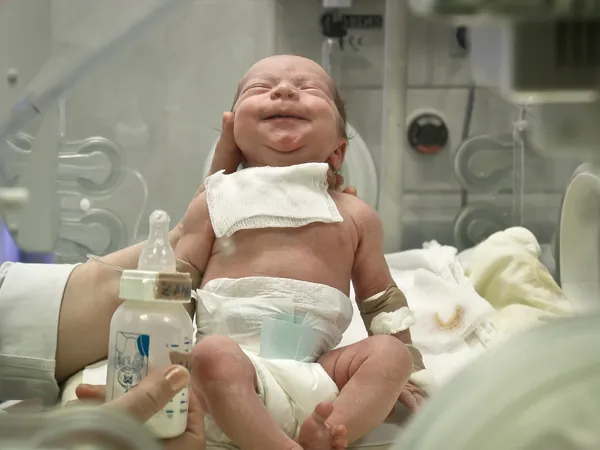
Why Do We Struggle to Remember Our Baby Days? New Research Reveals Surprising Insight Into Infant Memory!
2025-03-29
Author: Jessica Wong
Have you ever felt a flicker of nostalgia, convinced you remember something from your infancy—perhaps the soft surroundings of your crib or the sweet taste of your first birthday cake? The truth is, those memories may not be what they seem. Research spanning decades indicates that most individuals are unable to recall personal experiences from their earliest years.
However, a groundbreaking new study suggests that while we may not vividly remember our early days, babies can indeed perceive their environment and form memories far earlier than previously assumed. This revelation opens a fascinating chapter in our understanding of infant cognition.
What Did the Study Uncover?
Conducted by researchers from Yale and Columbia universities, the recent study published in Science examines the memory formation capabilities of infants as young as 12 months old. Utilizing a specialized brain scan designed for infants, the team was able to monitor how babies' brains responded while they were awake and engaged with various images of faces and objects. Parents were on hand to ensure the infants felt secure and alert throughout the session.
Twenty-six infants, aged four to 25 months, participated in the study. Researchers found that increased activity in the hippocampus—the brain region responsible for memory storage—correlated with the duration of time babies gazed at previously seen images when they reappeared. This behavior hints at the possibility of memory recognition.
Lead author Tristan Yates, a postdoctoral research scientist at Columbia, remarked, “Our results suggest that babies’ brains have the capacity for forming memories, but the longevity of these memories is still an open question.”
This marks a significant advancement in observational techniques, as most prior studies relied on indirect measures, such as familiar reactions. Here, for the first time, scientists witnessed real-time memory formation in conscious infants.
Implications for Understanding Early Memories
The implications of this research challenge long-held beliefs that episodic memories—a specific type of memory associated with personal experiences—begin forming only after a baby reaches 18 to 24 months. The study not only confirmed memory capacity in infants older than 12 months but also hinted at the emergence of these capabilities in babies even younger.
Currently, it is believed infants start forming basic types of memories at about two or three months, encompassing implicit memories like motor skills or the ability to recognize familiar patterns in their environment. Yet, true episodic memory, which involves recalling distinct events, requires a more developed hippocampus.
As Cristina Maria Alberini, a neural science professor at NYU, states, the developmental stage of the hippocampus during infancy is potentially 'critical' for forming and retaining memories, with significant implications for cognitive health.
The Mystery of Infantile Amnesia
The phenomenon of being unable to recall early memories, known as 'infantile amnesia,' has puzzled scientists for years. Traditionally, it was thought that babies' brains lacked the maturity to store episodic memories; however, this new research reveals that babies are indeed forming memories but struggle to retain them as they age.
One intriguing theory posits that the rapid creation of new neurons during early brain development might 'overwrite' existing memories. Additionally, neurologists suggest that the development of language and a sense of self might play critical roles in how we categorize and retrieve memories, abilities that typically begin to emerge around ages three to four.
Another perspective proposes that forgetting may serve a developmental purpose, allowing the brain to prioritize overarching knowledge over specific, less pertinent memories.
Can Anyone Recall Infancy Events?
Interestingly, some individuals claim to remember experiences from their infancy. However, these recollections may not stem from authentic episodic memory. According to the recent study, this is likely related to 'source misattribution'—where individuals confuse memories derived from external sources, like family stories or photographs, with personal experiences.
Yale is also embarking on a new study where parents will capture videos of their babies’ everyday experiences. This approach aims to determine if children can reconnect with these memories as they grow, utilizing modern technology to assess brain activity.
The Future of Memory Research: Are Early Memories Recoverable?
A contentious debate remains about whether childhood memories are entirely erased or merely inaccessible. While recent studies suggest that recovering early life memories might become possible, Yates notes that early memories may be recalled during early childhood but not later in life.
Studies conducted on adult rodents indicate that certain memories, when specifically targeted, can be reactivated. Although similar techniques are not applicable to humans yet, they provide hope that our earliest memories may linger in some form within our brains.
Figures such as Sigmund Freud posited that early childhood experiences could remain buried in the unconscious, potentially retrievable through therapeutic methods. Despite the controversy surrounding memory validation, the exploration of how infant memory functions will surely remain a hot topic in cognitive science research.
The discovery that babies can form memories earlier than previously believed—despite our struggles to recall those early years—offers captivating insights into how we understand human development and memory. As research progresses, we may uncover more about the complex workings of a baby’s mind and the mysteries of memory. Keep an eye on updates in this exciting field, as the future might hold answers to our earliest instincts.


 Brasil (PT)
Brasil (PT)
 Canada (EN)
Canada (EN)
 Chile (ES)
Chile (ES)
 Česko (CS)
Česko (CS)
 대한민국 (KO)
대한민국 (KO)
 España (ES)
España (ES)
 France (FR)
France (FR)
 Hong Kong (EN)
Hong Kong (EN)
 Italia (IT)
Italia (IT)
 日本 (JA)
日本 (JA)
 Magyarország (HU)
Magyarország (HU)
 Norge (NO)
Norge (NO)
 Polska (PL)
Polska (PL)
 Schweiz (DE)
Schweiz (DE)
 Singapore (EN)
Singapore (EN)
 Sverige (SV)
Sverige (SV)
 Suomi (FI)
Suomi (FI)
 Türkiye (TR)
Türkiye (TR)
 الإمارات العربية المتحدة (AR)
الإمارات العربية المتحدة (AR)